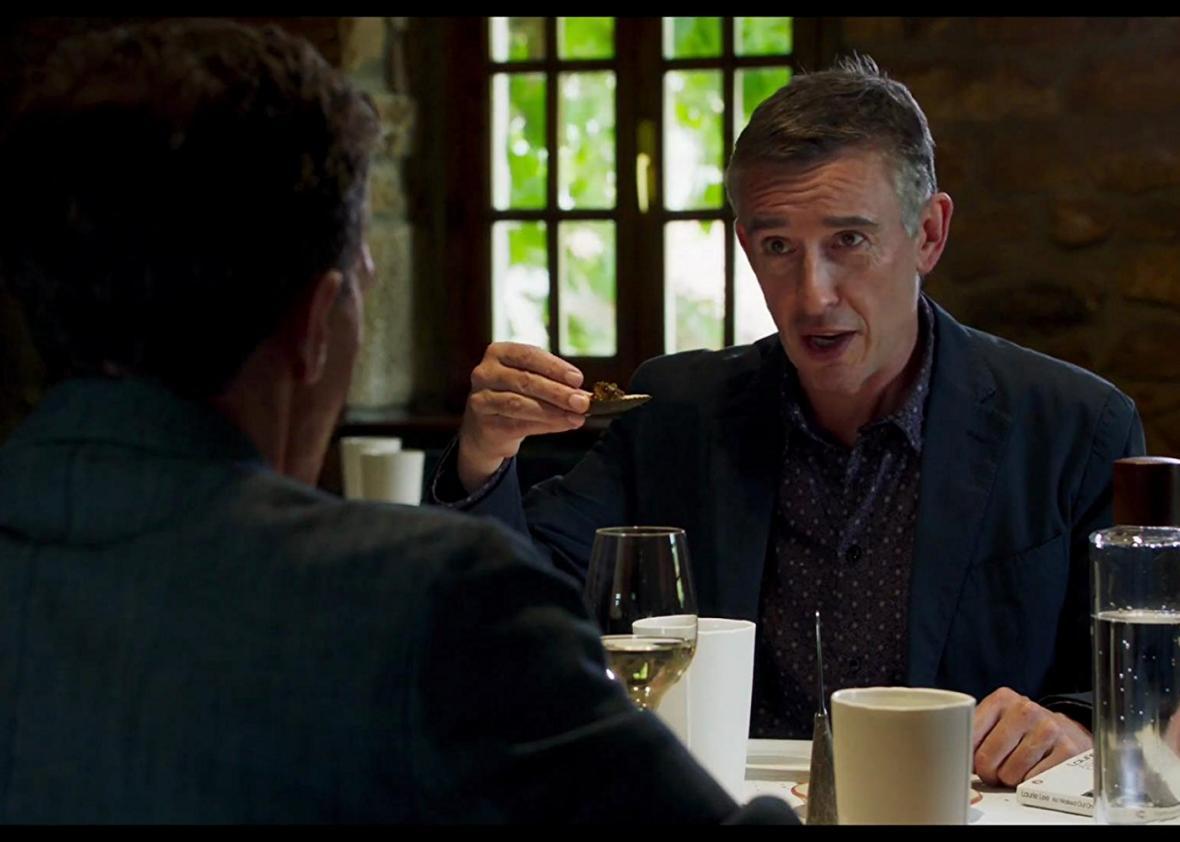There’s always a table. In the Trip series, the backdrop changes from the wild and wintry moors of northern England to the bucolic Italian haunts of Byron and Shelley to the scorching Spanish coast, but for much of the running time we’re pitched up at a table, at either end a middle-aged British comedian trying to out-joke the other as they dine on haute cuisine. Steven Coogan and Rob Brydon swap anecdotes, they bicker, they reflect on their youth, but mostly they unroll an endless string of celebrity impressions, from Mick Jagger and Michael Caine to an entire gallery of Bond actors. The scenes are largely improvised, meaning the success of the whole endeavour relies on how interesting the two stars can make the conversation.
It sounds an unlikely premise even for a single low-budget exercise, and yet three films in (with talk of more to come) Michael Winterbottom’s The Trip movies are officially a franchise. The Trip to Spain, the third film to star Coogan and Brydon as fictionalized versions of themselves on a gastronomic tour of a European country, is opening in the midst of summer movie season, alongside prospective franchise-starters like The Emoji Movie and The Dark Tower, a third Planet of the Apes prequel and the second Spider-Man reboot in five years. The Trip to Spain, where the world is not saved and nothing even blows up, is nothing like a modern franchise movie, and yet it’s the most essential one of the summer.
It’s not just that The Trip to Spain might be the funniest movie of the year, another buoyant midlife crisis-com that rounds out what could be the greatest purely comic trilogy of all time. (Great or even good comedy sequels are rare, but notable comic trilogies—perhaps discounting Edgar Wright’s loosely thematic Cornetto Trilogy, which mixes comedy with action and fantasy—are otherwise virtually non-existent.) The Trip to Spain exists in spite of all logic, an R-rated meta-comedy sequel starring actors who have never been household names in the U.S.—Brydon is virtually unknown outside the Trip series—and that very improbability is one of the things that makes the movie something to cherish.
When we think of the modern franchise, the likes of the Marvel Cinematic Universe and Disney’s plan for an endless string of Star Wars spinoffs, we think of creation by committee. But the Trip series bears in its meta-tastic pseudo-documentary-style the authorial stamp of one—or, at most, three, if you count Coogan and Brydon as co-auteurs alongside Winterbottom. When we think of sequels, we think money-spinners, but no movie in The Trip franchise has take in more than $6 million globally (at least so far).
The Trip to Spain is a palate cleanser after a loud and obnoxious summer at the multiplex. So many franchise films seem unnecessarily lengthy, regularly breaching the two-hour mark; The Trip to Spain, the longest entry in its series, clocks in at a brisk 108 minutes. (Each of the three films is a boiled-down version of a six-episode miniseries that first shows on television in the U.K., where Coogan and Brydon are much bigger audience draws.) Offering a break from the assault-the-senses maximalism of world-threat blockbusters like Guardians of the Galaxy, Vol. 2 and Wonder Woman, The Trip to Spain’s big set pieces all happen at that dinner table, and involve nothing more than verbal duels between two seasoned comic improvisers.
This kind of simplicity is what we’ve come to expect from the series. To keep things thrilling, Captain America can go from a WWII adventure to a conspiracy thriller to an action epic, and yet the Trip films, at least for now, are rigidly sticking to the basic format of food and talk. Some have criticized The Trip to Spain for being yet another travelogue interspersed with the now customary half-dozen restaurant visits, but that might be missing the point somewhat—the unchanging set-up doesn’t matter all that much because, as with Richard Linklater’s Before films, we’re ultimately watching how the two people at the center of this world change as they grow older.
The occasional R-rated franchise film like Deadpool or Logan can appeal to adults, or at least the adult-aspirant, but they’re never geared towards that demographic alone. The Trip films are made for adults only—and it’s not just the cursing. Coogan and Brydon’s conversations encompass dead poets and obscure artists, ancient history and great high art, various neuroses that recede and become more pronounced with time. The movies are unfailingly amusing, nimbly striking a balance between Coogan’s acid wit and Brydon’s infectious silliness, but death and legacy are always underlying preoccupations, growing in importance with each subsequent feature.
In the likes of Spider-Man: Homecoming and War for the Planet of the Apes, there’s no real sense of finality; even when a successful series comes to a purported end, another reboot is always lurking just around the corner. The Trip movies, by contrast, feel palpably limited. Like their stars, these films have finality perpetually on their mind. We’ll only get to see so many; there will be no reboots of this franchise, and the roles will not be recast. A skit can go layers deep, as when we find Coogan and Brydon hysterically impersonating the recently deceased David Bowie in all his numerous guises, but still the scene will really be about the two comedians addressing the relentlessness of time, approaching the truth of their own mortality in perhaps the only way they’re able to process it—through funny voices. No other modern movie franchise can reliably leave a lump in the throat at the same time as making us laugh so hard.
